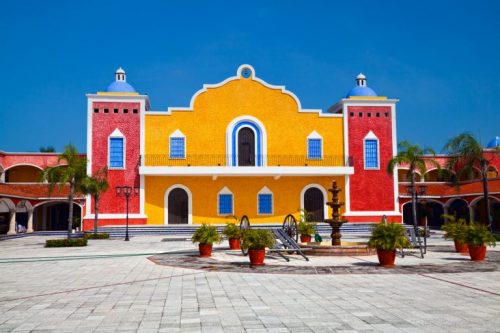Travel Vaccinations & Advice For Mexico

Mexico is extremely diverse and often paradoxical. With lush jungles, cactus dotted deserts, snow-capped volcanoes, sandy beaches and colorful coral reefs, the nature here is incredibly spectacular. Mexico was once home to some of the most mythical ancient civilizations like Zapotec, Maya and Aztec, which left inestimable vestiges behind them. In Mexico City, the capital, magnificent Spanish colonial buildings lie next to ultra modern skyscrapers. From shy indigenous to active city dwellers, the charming Mexican people are as contradictory as the architecture… But they all share a universal love for colorful fiestas and perfectly embody the spirit of Latin America.
HEALTH INFORMATION
Risk of Zika in this Country. Learn More >>
We make every effort to ensure that the information posted on our website is up to date and accurate according to the latest public health recommendations; however, it is impossible for us to make changes on a daily basis.
For the most current travel health recommendations, please call our clinic as make an appointment with one of our travel health professionals.
MEXICO – RECOMMENDED VACCINES
| Hepatitis A | Recommended for all travelers. |
| Tetanus – Diphteria – Pertussis Vaccine | Tetanus: In exceptional circumstances (eg, stay in a region where access to health care is limited), for a person aged 18 years or older, 1 dose of DT may be given if 5 years or more has elapsed since the last dose. Otherwise, one booster dose at the age of 50*. Pertussis (Whooping Cough): 1 dose is recommended for pregnant women, for every pregnancy, regardless of immunization history and the interval since the last dose (betwen week 26 and 32). *Only applicable for Quebec. |
| Measles – Rubella – Mumps | Two doses recommended for all travelers born after 1970, if not previously given. |
| Flu – Influenza | Seasonal influenza occurs worldwide. The flu season usually runs from November to April in the northern hemisphere, between April and October in the southern hemisphere and year round in the tropics. Influenza (flu) is caused by a virus spread from person to person through coughing and sneezing or by touching infected surfaces. Everyone 6 months and older should get a flu vaccine yearly. Vaccine is recommended 14 days prior to departure. |
| Routine vaccines (dCaT, Polio, Meningococcal, Shingles, Pneumococcal, Hepatitis B, HPV, MMR & Varicella) | Recommended for all travelers |
| Causes, Symptoms & Treatment – Typhoid fever | Recommended for most travelers, especially those who are staying with friends or relatives; visiting smaller cities, villages, or rural areas where exposure might occur through food or water; or prone to “adventurous eating” |
| Hepatitis B | Consider for most travelers; recommended for those who might be exposed to blood or other body fluids, have sexual contact with the local population, or be exposed through medical treatment (e.g., for an accident). |
| Transmission, Symptoms and Prevention – Rabies | For travelers at high risk of animal bites or being involved in activities with bats, dogs and other mammals. Clients who plan to visit remote areas may consider receiving this vaccine. Important to note the pre-exposure rabies vaccine is administered in 2 doses with one week interval between doses. Post-exposure vaccination is always recommended, even for those previously vaccinated. |
| Chagas Disease | Presence. All travelers should protect themselves against triatomine bugs. |
| Turista – Traveler’s Diarrhea (ETEC) | Talk to your health care professional about the risks and precautionary measures to take, as well as the Dukoral® vaccine. Important to note that the Dukoral vaccine is an oral vaccine given in 2 doses, recommended at least 2 weeks prior to departure. |
| Malaria | Malaria is present in this country. The risk may be region specific. Prophylaxis measures to be discussed with the health care professional. |
| Dengue Fever, Chikungunya and/or Zika | There are many illnesses that are transmitted via mosquito bites and unfortunately we do not have vaccines to protect us against most of them. It is important to inquire with your healthcare professional regarding the specific risks and the different illnesses presently in circulation. |
RECOMMENDED MEDICATIONS
| Antimalarials Recommended | Malarone, Doxycycline,Chloroquine or Mefloquine |
| Antibiotics Traveler’s Diarrhea | Ciprofloxacin, Azithromycin or Suprax. |
| Acetazolamide/Dexaméthasone | Recommended to prevent Acute mountain sickness (AMS). |
MEDICAL CARE
In Mexico, it is easy to access excellent medical care in the numerous private hospitals and clinics located in big cities, which are modern, well equipped and have highly qualified medical personnel. Public hospitals offer satisfying basic care, but waiting times can be extremely long. Be aware that medical facilities can be limited in remote places.
In case of emergency in Mexico, you can call an ambulance at 060.
In large cities, pharmaceutical products of good quality are not difficult to find. The pharmacies in the country are usually well stocked. But it is always safer to bring your own basic medical kit and to undergo a medical check before traveling to the country.
SECURITY ABROAD
There was a significant increase in violent crime, including homicides, kidnappings and extortions nationwide. Please read the government of Canada advisories.
CANADIAN EMBASSY
Emergency services
In case of an emergency:
- Dial 911
You can also reach 24/7 from anywhere in Mexico:
- The Embassy of Canada in Mexico City: 800-706-2900
Road assistance
The Green Angels (Angeles Verdes), a highway patrol service, provides free assistance on all major toll highways from 8 a.m. to 6 p.m.
In case of an emergency, dial 078 or 800 006 8839 (toll free in Mexico).
